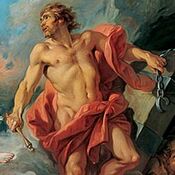ENGL 2111/Fall 2020/Schedule/Lesson 7: Difference between revisions
m (Added more directions.) |
m (Updated quiz link.) |
||
| Line 14: | Line 14: | ||
| style="text-align:center;" | 11/17 || {{Bulleted list |Ovid’s ''Metamorphoses'': Prologue; Creation; The Four Ages; Lycaon; The Flood; “Apollo and Daphne” (pp. 1–19) |[[Ovid's Metamorphoses|Ovid’s ''Metamorphoses'']] }} || style="text-align:center;" | {{Clickable button 2|Quiz|url=https://forms.gle/KJkq5iAAPk4GHvua7|class=mw-ui-progressive}} || style="text-align:center;" | {{Clickable button 2|Respond|url=https://discourse.grlucas.net/tag/ovid|class=mw-ui-progressive}} || {{CNone|-}} | | style="text-align:center;" | 11/17 || {{Bulleted list |Ovid’s ''Metamorphoses'': Prologue; Creation; The Four Ages; Lycaon; The Flood; “Apollo and Daphne” (pp. 1–19) |[[Ovid's Metamorphoses|Ovid’s ''Metamorphoses'']] }} || style="text-align:center;" | {{Clickable button 2|Quiz|url=https://forms.gle/KJkq5iAAPk4GHvua7|class=mw-ui-progressive}} || style="text-align:center;" | {{Clickable button 2|Respond|url=https://discourse.grlucas.net/tag/ovid|class=mw-ui-progressive}} || {{CNone|-}} | ||
|- | |- | ||
| style="text-align:center;" | 11/24 || {{Bulleted list |Ovid’s ''Metamorphoses'': “Io and Jove“; “Europa and Jove”; “Iphis and Ianthe”; “Pygmalion” (pp. 19–37) |Read a source from the [[Metamorphoses Study Guide|study guide]] or find your own secondary source (or video) to help you. Some of you will need to create new threads in the forum; be sure to mention what you learned from your secondary source. }} || style="text-align:center;" | {{Clickable button 2|Quiz|url=https://forms.gle/gzcm9yg1mQkjNJYA6|class=mw-ui-progressive}} || style="text-align:center;" | {{Clickable button 2|Respond|url=https://discourse.grlucas.net/tag/ovid|class=mw-ui-progressive}} || style="text-align:center;" | {{Clickable button 2|Test|url=https://forms.gle/ | | style="text-align:center;" | 11/24 || {{Bulleted list |Ovid’s ''Metamorphoses'': “Io and Jove“; “Europa and Jove”; “Iphis and Ianthe”; “Pygmalion” (pp. 19–37) |Read a source from the [[Metamorphoses Study Guide|study guide]] or find your own secondary source (or video) to help you. Some of you will need to create new threads in the forum; be sure to mention what you learned from your secondary source. }} || style="text-align:center;" | {{Clickable button 2|Quiz|url=https://forms.gle/gzcm9yg1mQkjNJYA6|class=mw-ui-progressive}} || style="text-align:center;" | {{Clickable button 2|Respond|url=https://discourse.grlucas.net/tag/ovid|class=mw-ui-progressive}} || style="text-align:center;" | {{Clickable button 2|Test|url=https://forms.gle/LcoxC281V2MjrAR8A|class=mw-ui-destructive}} | ||
|} | |} | ||
{{:ENGL 2111/Fall 2020/Lesson-tabs-bottom}} | {{:ENGL 2111/Fall 2020/Lesson-tabs-bottom}} | ||
Revision as of 07:57, 22 November 2020
Before beginning your work each week, read through the whole lesson so you know what to expect and understand what’s expected. Each tab corresponds to a lesson. All assignments are contained therein. Any questions should be posted to the class forum, and be sure to read my weekly feedback. |
| L1 | L2 | L3 | L4 | L5 | L6 | L7 |
November 11 – November 24: Ovid’s Metamorphoses, the Anti-Epic
Our final lesson looks at Ovid’s famous book of changes.
Ovid’s major work, the Metamorphoses, makes pains to be anti-Aeneid in its disregard of authority and the interests of the state: it has no epic hero, it critiques unity by contriving connections, and does not lead to a central order. Rather than taking an elevated tone, the Metamorphoses plays with style and theme to make this history’s first anti-epic. Yet, despite the playful wit and iconoclasm of the Metamorphoses, Ovid takes on some themes that have truly serious nature, even for readers today.
Lesson Instructions and Explanation
|
|---|
|
Generally to avoid confusion, I have tried to make all lessons work the same way. Each lesson will have its weekly section presented in a chart. Work your way from left to right. Open links in tabs, so you don’t lose track of this page. DueThis is the date this sections’s work is due. Complete everything in the row before 11:59:59 pm on this date. ReadThese are the readings for this section. Read them carefully, taking notes as you do. I recommend reading from a book or on paper, as you can highlight an annotate as you progress. This will help you in the next sections. DoThis section will usually be a reading quiz on what you just read, so be sure to take it while the reading is fresh in your mind. However, it may also include other assignments or activities that must be accomplished. WriteMost writing will be on the class forum. This section will contain instructions and guidance for completing your writing. Often, this will link to a series of discussion prompts for the text you’re reading. Choose one prompt, or thread, to answer, or create your own post (especially if there are none there you can or want to respond to) by clicking + New Topic. I’m looking for your engagement here, so aim for a single longish post and a shorter response to someone else’s post. Using secondary sources correctly for support will always earn you more points. Be sure you’re following the conventions outlined in and the guidelines in . TestThe test will be the last activity. It will test your knowledge of the entire lesson’s materials. Take this only after you have accomplished everything else in the lesson. The idea here is that you show me what you learned about the all of the lesson’s material. Please write in complete sentences and give enough detail to answer the questions. Your answers should convince me that you have learned and thought about the materials. |
| Due | Read | Do | Write | Test |
|---|---|---|---|---|
| 11/17 |
|
- | ||
| 11/24 |
|
| 🕒 11-22-2020 | 📆 Make an Appointment | 💬 Ask a Question | 📣 Leave Feedback |

